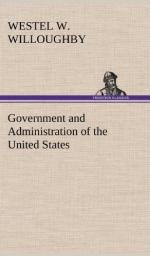The proper limits of state action are discussed in Mill’s Essay on Liberty; Huxley’s Administrative Nihilism (Humboldt Lib.); Spencer’s Social Statics, Man versus the State, The Coming Slavery, and The Sins of Legislators (Humboldt Lib.); Stephen’s Liberty, Equality, Fraternity; Humboldt’s Sphere and Duties of Government; and H.C. Adams’ State in Relation to Industrial Action, published by the American Economic Association. Wilson’s The State contains a valuable chapter upon the functions of government. For a description of existing forms of government, Prof. Woodrow Wilson’s The State is very valuable. See also Statesmen’s Year Books.
Colonial Governments.
Volumes III, IV, and V of Winsor’s Narrative and Critical History of America, 8 vols., contain excellent monographs upon the founding, history and nature of government of the various colonies. Doyle’s two volumes, entitled The English Colonies in America, present an exhaustive study of the American colonies from an European point of view. A handy digest of this work is contained in his small History of the United States, published as one of the volumes in “Freeman’s Historical Course for Schools.” Lodge’s Short History of the English Colonies in America is chiefly devoted to colonial social life. In the preparation of the chapter upon Colonial Governments, we have obtained the most assistance from the first volume of Story’s Commentaries upon the Constitution. Pages 15 to 50 of Hannis Taylor’s Origin and Growth of the English Constitution are important. Fiske’s Beginnings of New England is an extremely interesting description of the early history of a single section. Steps Toward Union and Independence.
See especially Story’s Commentaries; Frothingham’s Rise of the Republic of the United States; Scott’s Development of Constitutional Liberty in the English Colonies in America; Fiske’s Critical Period of American History; and A.B. Hart’s Formation of the Union, 1763-1829, to appear in the series, “Epochs of American History.” For the Albany plan of union see Franklin’s Life and Letters, Vol. 4. For an account of the causes leading to revolution written from an essentially English standpoint, see Lecky’s History of England in the Eighteenth Century, Vol. IV.
Articles of Confederation.
Best upon this subject are: Curtis’ History
of the Constitution;
Marshall’s Life of Washington; Bancroft’s
History of the United
States; and Winsor’s Narrative and Critical
History of America, Vol.
VII, article The Confederation by the Editor.
See also Secret
Journals of Congress, and authorities cited above.
Constitutional Convention and the Adoption of the Constitution.




